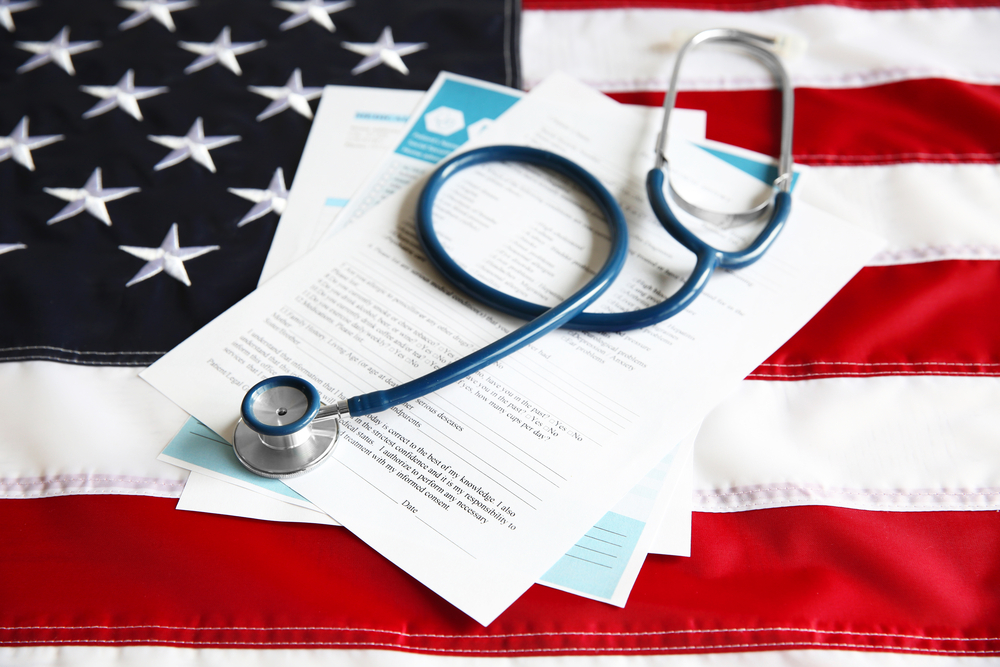To find out more about health insurance options for expats in the USA, watch our podcast episode, ‘Understanding Health Insurance In The USA With Cigna Healthcare‘.
Heading to the USA and wondering how you’ll stay covered when it comes to healthcare? With no free national health service like many other countries, sorting out health insurance should be at the top of your to-do list when relocating stateside. But where do you start when it comes to picking a provider and policy? What exactly should your health insurance cover as a minimum? And how can you avoid any unexpected medical bills that might break the bank? This guide breaks down everything you need to know as an expat when it comes to getting healthcare coverage in the USA.
The US Health System
Unlike most other developed countries, the USA does not provide free or subsidized healthcare to all its citizens and residents. Healthcare is privatized and operates as a free market system. This means that individuals are expected to pay for their own healthcare costs, whether through private health insurance, out-of-pocket payments, or a combination of both.
Some key things to understand about the US health system:
- There is no universal national health insurance scheme. Medicare provides coverage only for those 65 and older, and Medicaid assists lower-income households.
- Most Americans rely on private health insurance, usually provided by their employer.
- Healthcare costs are very high compared to other countries and can quickly become unaffordable without adequate insurance.
- Having health insurance is mandatory – you may have to pay a penalty at tax time if you don’t have a policy.
- Each state regulates its own healthcare system under federal law, so there can be variations in coverage and costs around the country.
Navigating these complexities as a foreigner and finding an insurance policy that properly covers you can be daunting. But doing your research beforehand will ensure you don’t get caught out by any unwelcome medical bills.
Essential Health Benefits
Thanks to the Affordable Care Act (also known as Obamacare), all health insurance plans are required to cover a core set of ‘essential health benefits’. This is the minimum level of coverage you need as an individual or family living in the USA.
These 10 essential benefits include:
- Ambulatory services (outpatient care)
- Emergency services
- Hospitalization
- Maternity and newborn care
- Mental health and substance abuse treatment
- Prescription drugs
- Rehabilitative and habilitative services
- Laboratory services
- Preventative and wellness services
- Pediatric services including vision and dental care
Any health plan you consider must cover these basics as a minimum. Your employer will likely provide an insurance plan that meets this criteria if they have over 50 employees. But it’s always wise to check the fine print.
Topping Up Your Coverage
Realistically, the minimum essential benefits won’t be enough coverage on their own for most people. Kate Lambon from Cigna says:
[People should] look at … broadening the scope of the plan and what it will cover.
You’ll want to look at ‘topping up’ your plan with extras like:
- Dental insurance – essential plans only cover dental for children. Adult dental work like cleanings, fillings and root canals can cost hundreds of dollars out of pocket.
- Vision insurance – again, only covered for kids as a basic benefit. But an eye exam and prescription glasses or contacts for an adult can be $500-600 or more.
- Lower deductibles – this is the amount you pay upfront before insurance kicks in. Aim for under $1000 if possible.
- Lower co-pays and co-insurance – this is the percentage you pay per service or treatment after your deductible is reached. The lower the better.
- Lower prescription medication costs – essential plans cover some scripts, but you’ll pay less for your regular medications with enhanced coverage.
- Extras like physiotherapy, chiropractic, massage, acupuncture – rarely covered on basic plans, but can keep you healthy.
Always read the fine print so you know exactly what’s covered and what’s not. Being forewarned means no nasty surprises with unexpected medical bills.
Finding a Healthcare Provider
One of your first steps after landing in the USA should be finding a local healthcare provider or ‘PCP’ (primary care physician). Kate Lambon from Cigna suggests:
To either get hold of the HR manager of the company that you’re going to and ask them for recommendations, or if you’ve got work colleagues or people that you’ve interviewed with or you’re gonna be working with, recommendations from them are always … the first port of call.
Ask any of the following for recommendations:
- Your employer’s HR manager
- Colleagues in your office
- New neighbors or friends
- Your insurance provider’s website – many have search tools for in-network doctors accepting new patients
- Online reviews – but take these with a pinch of salt!
When researching providers, look for words like “expat-friendly”, “international patients welcome” or “foreign language skills”. This indicates they likely have experience treating people from different cultures and navigating overseas health systems.
To transfer your medical records, download your files through an official online healthcare portal (like MyHealthRecord in Australia or NHS App in the UK) or request copies from your current doctor to bring with you. Translate any important documents as needed.
Understanding Healthcare Emergencies
In a medical crisis, dial 911 for an ambulance anywhere in the USA. Emergency rooms at hospitals are also equipped to handle urgent health issues 24/7. Costs for ambulances and ER visits can be thousands of dollars without insurance, so be prepared.
For non-life-threatening concerns, find a local urgent care clinic which offers walk-in appointments and usually costs much less than an ER visit. Your insurance provider can direct you to in-network urgent care facilities. Kate Lambon from Cigna says:
Those are really useful and really easy to get into and you’ll wait far less time if you can get yourself to one of those clinics rather than going to the emergency department if you don’t need to.
Keep the Poisons Helpline number handy: 1-800-222-1222. Help is a phone call away for poison emergencies, 24 hours a day.
The High Cost of Medications
One major difference from countries with government subsidized healthcare is the high cost of prescription medications in America. As Kate Lambon from Cigna says:
Nothing is government regulated in the States. It’s a free market. So you will find, for example, chronic disease drugs like diabetes … upwards of $500 a month. Share on XEven with insurance coverage, you’ll typically have a copay of $10-50 for each script filled.
Some ways to save:
- Choose generic over brand name drugs when possible
- Look into free discount cards from major chains like Kroger, Walmart and GoodRx
- Order certain prescriptions online from overseas pharmacies (use caution)
- Travel to Mexico or Canada to purchase scripts in person
- Enroll in prescription delivery services to lower copays
Having adequate prescription drug coverage is crucial, especially if you take any expensive long-term medications.
What’s Not Covered? ‘Extras’ to Budget For
In addition to dental, vision and medication costs, most health insurance plans classify other common treatments as ‘extras’ that you’ll pay for out of pocket or with special add-on policies. These include:
- Alternative therapies like massage, acupuncture and chiropractic
- Cosmetic procedures including plastic surgery
- Fertility treatments like IVF
- Hearing aids
- Long-term care including nursing homes
Some of these extras you can live without. But it’s important to think through your unique needs and budget accordingly. For example, comprehensive dental implants to replace missing teeth could set you back $25,000 or more if you don’t have sufficient coverage.
Preventative Care
One way to maximize the benefits of your health insurance in the USA is to take advantage of included preventative care services. Most plans provide the following at low or no cost:
- Annual physical exam
- Age and gender appropriate cancer screenings
- STD testing
- Vaccinations
- Well-woman exams including pap smears
- Prostate and colorectal exams
- Routine blood work
This kind of preventative care helps spot problems early before they become serious (and expensive) down the line.
Managing the cost of healthcare in the USA takes some preparation and effort up front as an expat. But you’ll have peace of mind knowing worst case scenarios are covered and you can access treatment when needed. Do your homework and get the right insurance plan for your personal situation.
Shopping for Health Insurance Providers
Once you know what kind of coverage you need, it’s time to pick a health insurance provider. Some top companies offering private policies include:
- Cigna
- Aetna
- Anthem Blue Cross Blue Shield
- Humana
- Kaiser Permanente
- UnitedHealthGroup
Insurance coverage will always be a required employee benefit at large companies with over 50 staff. But you may need to source your own policy if you’re a contractor, digital nomad or work for a small business.
When comparing plans:
- Check if your current doctors are in-network to keep costs low
- Make sure medications you take regularly are covered
- Look for premiums you can afford long-term
- Inquire about deductibles, co-pays, co-insurance, out-of-pocket maximums
- Consider any pre-existing conditions that require coverage
- Double check that pregnancy costs are included if trying to conceive
Some provinces allow families to stay on parent’s insurance until age 26. This is another option for younger expats transitioning to life in America.
While shopping around, utilize an independent health insurance broker to explain policies and find the best fit based on your budget and needs.
Ongoing Health in the Expat Life
Managing your physical and mental wellbeing in a foreign country has its own unique challenges. Be proactive about finding healthcare providers you connect with and keep up with routine preventative screening. Don’t be shy about asking questions to understand treatment plans and insurance coverage.
Prioritize regular exercise, nutrition and sleep to help manage the stress of expat living. Build a community through clubs, places of worship and expat groups.
Most importantly, avoid delaying medical care due to uncertainty or fears over cost. From doctors visits to prescription refills, use healthcare services as you normally would back home. Preventative steps now avoid health declines down the road.
With the right insurance coverage and proactive self-care, you can thrive health-wise during your expat American adventure. Consult the range of providers available and don’t hesitate to access the care you need.
The Bottom Line
Do diligent research before your move to understand your options and secure adequate insurance for your situation. Read the fine print of policies so you know exactly what’s covered and what’s not. Proactively find trusted doctors, dentists and specialists for your family. And take advantage of preventative care benefits to stay well.
With a thoughtful approach, getting sick or injured doesn’t have to devastate your finances even without a national health system. Arm yourself with information to avoid confusion over things like emergency services, prescriptions, essential benefits and pre-existing conditions. Seek help from healthcare navigators, brokers and HR contacts as needed.
At the end of the day, safeguarding your physical and mental health, along with your wallet, starts with picking the right health insurance fit. Do your due diligence before arriving stateside for true peace of mind. Your new life chapter awaits – with coverage you can count on.


